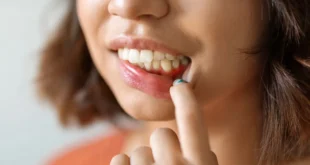A toothache can be an uncomfortable and distressing experience, often causing pain and discomfort in the mouth. In this article, we’ll explore what toothaches are, their causes, symptoms, when to seek medical care, and treatment options, including home remedies.
What is a Toothache?
A toothache refers to pain or discomfort in or around a tooth. It can vary from mild to severe and may be constant or intermittent. Toothaches are often a sign of an underlying dental problem and should not be ignored.
2. Toothache Causes:
Toothaches can be caused by various factors, including:
Sensitive Teeth:
Sensitive teeth can cause discomfort when exposed to hot or cold temperatures or sweet foods. This sensitivity may be due to enamel erosion, gum recession, or tooth decay.
Damaged Tooth:
A cracked, chipped, or fractured tooth can result in pain, especially when biting or chewing. In some cases, the inner pulp of the tooth may become exposed, leading to inflammation and infection.
Wisdom Teeth:
Impacted or erupting wisdom teeth can cause pain and discomfort, particularly if they become infected or push against neighboring teeth.
Other Possible Causes:
Other potential causes of toothaches include gum disease, abscesses, sinus infections, jaw joint disorders, and even heart problems in rare cases.
3. Symptoms of Toothaches:
Common symptoms of a toothache may include:
- Sharp or throbbing pain in the affected tooth or surrounding area
- Sensitivity to hot, cold, or sweet foods and drinks
- Swelling or redness around the affected tooth or gums
- Fever or headache in severe cases
4. When to Seek Medical Care:
It’s important to see a dentist if you experience persistent or severe tooth pain, swelling, or other concerning symptoms. Delaying treatment can lead to further complications and may require more extensive dental procedures.
5. Exams and Tests for Toothaches:
During a dental examination, your dentist will evaluate the affected tooth, perform tests to determine the cause of the pain, and may take dental X-rays to assess the extent of any underlying damage.
6. Treatment and Prevention:
Treatment for a toothache will depend on the underlying cause but may include:
Home and Natural Remedies for Toothache Pain:
While professional dental care is essential for treating toothaches, several home remedies and natural treatments can help alleviate pain and discomfort:
- Saltwater Rinse: Gargling with warm salt water can help reduce inflammation and kill bacteria in the mouth.
- Hydrogen Peroxide Rinse: Diluting hydrogen peroxide with water and using it as a mouthwash can help kill bacteria and reduce pain.
- Cold Compress: Applying a cold compress to the outside of the cheek can help numb the area and reduce swelling.
- Peppermint Tea Bags: Placing cooled peppermint tea bags against the affected tooth can provide temporary pain relief.
- Garlic: Chewing on a clove of garlic or applying garlic paste to the affected tooth can help reduce pain and fight infection.
- Vanilla Extract: Applying a small amount of vanilla extract to the affected tooth can help numb the area and reduce pain.
- Other Natural Remedies: Clove oil, guava leaves, wheatgrass juice, thyme oil, and toothache plant extracts are also believed to have pain-relieving and antibacterial properties.
Medical Treatment:
- Dental fillings or crowns to repair damaged teeth
- Root canal therapy to remove infected pulp tissue
- Extraction of severely damaged or impacted teeth
- Antibiotics to treat bacterial infections
7. Prevention:
To prevent toothaches, practice good oral hygiene habits, including brushing twice a day, flossing daily, and visiting your dentist for regular check-ups and cleanings. Avoid sugary foods and drinks, quit smoking, and wear a mouthguard if you grind your teeth.
8. Outlook for Toothaches:
The outlook for toothaches is generally good with prompt dental treatment. Most cases can be effectively managed with conservative measures or dental procedures, restoring oral health and relieving pain.
Toothaches can be debilitating, but with proper dental care and home remedies, you can alleviate pain and discomfort while addressing the underlying cause of the problem. Remember to consult your dentist for a thorough evaluation and treatment plan tailored to your specific needs.
It is important to consult a dentist for an accurate diagnosis and to determine the appropriate treatment for each case.
 Love Airdrie Love Airdrie
Love Airdrie Love Airdrie








